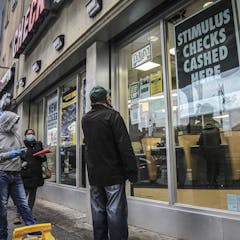
Articles on Rent
Displaying 1 - 20 of 31 articles

The US economy relies on immigrants to fill jobs, but many of them are struggling with high rent burdens that make it harder to build productive lives and integrate into their communities.

For the Commonwealth, the best measure is rent assistance. For the states, it’s a mix of two-thirds first homebuyer grants and one-third stamp duty discounts.

Most research on unaffordable housing has focused on homeownership, but rental affordability is also a serious issue.

Hamilton city council’s vote to pass an anti-renoviction bylaw is an important step in addressing housing affordability in Ontario.

Here are 12 questions worth considering before you sign a residential tenancy agreement.

The thinking behind the state government’s ambitious housing plan is simple - build more homes and they’ll be more affordable.

Despite the claims of landlords and politicians, there is no economic consensus against rent controls. A more nuanced debate would help, given the scale of New Zealand’s housing affordability problem.

During lockdowns renters ‘voted with removalists vans’, moving out of share houses and in with each other.

In order for Canada to overcome the housing affordability crisis, individuals, families, the real estate industry and government all need to work together.

As property values skyrocket, long-term renters — many of whom are elderly — face the very real risk of homelessness.

The big increases quoted are for “asking rents”. The rents paid by existing renters are climbing more slowly.

Manufactured housing – the preferred name for what were once called mobile homes – has changed dramatically in recent decades. Three planning experts call for giving it a new look.

It’s getting much harder in the US to find an affordable home, even for people who work multiple jobs.

‘Informal evictions’ in which landlords harass or pressure tenants out of their homes continued during the the pandemic and may have even seen an increase.

Residents of Nairobi’s informal settlements use names as a way of voicing the issues that they struggle with every day.

The government of Ghana needs a more creative solution to the problem of advance rent payment

Understanding the experiences of van dwellers is important not just for those looking to cut their ties to rents and mortgages, but also for community planners and employers.

Ghettos of crime, drugs and vice? Full of people bludging off the state? That’s typical of the unfair stigma attached to public housing, and it distracts us from more fundamental issues.

A loose patchwork of measures and systems has left millions at risk of slipping through the cracks as the pandemic’s economic downturn hits.

Current measures prohibiting the eviction of tenants and helping them through the financial crisis won’t last forever. A 40-year-old voucher program might be a longer term solution.
